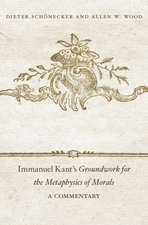Holding and Letting Go: The Social Practice of Personal Identities
Autor Hilde Lindemannen Limba Engleză Paperback – 8 dec 2016
| Toate formatele și edițiile | Preț | Express |
|---|---|---|
| Paperback (1) | 291.46 lei 31-37 zile | |
| Oxford University Press – 8 dec 2016 | 291.46 lei 31-37 zile | |
| Hardback (1) | 495.80 lei 31-37 zile | |
| Oxford University Press – 23 ian 2014 | 495.80 lei 31-37 zile |
Preț: 291.46 lei
Preț vechi: 353.19 lei
-17% Nou
Puncte Express: 437
Preț estimativ în valută:
55.77€ • 58.23$ • 46.05£
55.77€ • 58.23$ • 46.05£
Carte tipărită la comandă
Livrare economică 04-10 aprilie
Preluare comenzi: 021 569.72.76
Specificații
ISBN-13: 9780190649609
ISBN-10: 0190649607
Pagini: 244
Dimensiuni: 137 x 206 x 18 mm
Greutate: 0.25 kg
Editura: Oxford University Press
Colecția OUP USA
Locul publicării:New York, United States
ISBN-10: 0190649607
Pagini: 244
Dimensiuni: 137 x 206 x 18 mm
Greutate: 0.25 kg
Editura: Oxford University Press
Colecția OUP USA
Locul publicării:New York, United States
Recenzii
A valuable addition to the literature on personhood and identity. Like most such texts, it recognizes the ambiguity of the concepts. However, while other texts then try to clarify and fix the ambiguity, Lindemann goes in another direction. She embraces it by presenting and examining the many ways in which practices of social connection, interaction, and disconnection shape, preserve, and even damage an individual's personal and social identity...In an age where the daily news contains stories of murder, rape, and persecution of humans by humans for reasons related to an inability or unwillingness to tolerate others for who they are, Lindemann provides no platitudes. Rather, she calls attention to the real, rollup-your-sleeves phroenetic work of personhood that can only be approached in steps and measured by effort. Her book resonates long after the last page is turned.
Holding and Letting Go is deceptively easy to read. The prose is so delightful and the observations so incisive that it is difficult to put it down. But a great deal of hard philosophical work is being done in these pages, and there is intricate engagement with a wide range of important contemporary positions. What emerges is a rich, new structure for thinking about the nature of identity and its relation to the kinds of ethical dilemmas and difficulties we face every day. We are shown not just a compelling and thought-provoking set of views about these issues, but a new way of thinking about them, one that promises to shed some light where things have been notoriously opaque... Holding and Letting Go is a sophisticated, tender-hearted, and clear-eyed view of persons that provides original and compelling insights into what we are and why it matters. We will be engaging with it for a long time to come.
In this book Hilde Lindemann shows us that good philosophy needs good writing, but also that good writing can contribute to good philosophy... it is how moral philosophy should be done.
In this wonderfully wise book Hilde Lindemann weaves stories into theory to help us see how we weave stories into lives, and how through these stories we hold each other in personhood-for good and for ill. Her stories put flesh on the dry bones of much-discussed, overly-abstracted philosophical problems; and in so doing she makes a case for philosophical theorizing as an embodied, engaged, emotionally and socially responsive practice.
With her characteristic lucid and engaging prose, Hilde Lindemann combines philosophical depth with richness of concrete detail in her new book
Lindemann writes with great sensitivity to the complexities of everyday identity work, and, one suspects, with no more and no less precision than the practice of personhood allows."
Lindemann manages to pull off that rarest of rare feats in academic philosophical writing: to say something that is at the same time philosophically insightful and universally relevant for beings like ourselves...
Holding and Letting Go is deceptively easy to read. The prose is so delightful and the observations so incisive that it is difficult to put it down. But a great deal of hard philosophical work is being done in these pages, and there is intricate engagement with a wide range of important contemporary positions. What emerges is a rich, new structure for thinking about the nature of identity and its relation to the kinds of ethical dilemmas and difficulties we face every day. We are shown not just a compelling and thought-provoking set of views about these issues, but a new way of thinking about them, one that promises to shed some light where things have been notoriously opaque... Holding and Letting Go is a sophisticated, tender-hearted, and clear-eyed view of persons that provides original and compelling insights into what we are and why it matters. We will be engaging with it for a long time to come.
In this book Hilde Lindemann shows us that good philosophy needs good writing, but also that good writing can contribute to good philosophy... it is how moral philosophy should be done.
In this wonderfully wise book Hilde Lindemann weaves stories into theory to help us see how we weave stories into lives, and how through these stories we hold each other in personhood-for good and for ill. Her stories put flesh on the dry bones of much-discussed, overly-abstracted philosophical problems; and in so doing she makes a case for philosophical theorizing as an embodied, engaged, emotionally and socially responsive practice.
With her characteristic lucid and engaging prose, Hilde Lindemann combines philosophical depth with richness of concrete detail in her new book
Lindemann writes with great sensitivity to the complexities of everyday identity work, and, one suspects, with no more and no less precision than the practice of personhood allows."
Lindemann manages to pull off that rarest of rare feats in academic philosophical writing: to say something that is at the same time philosophically insightful and universally relevant for beings like ourselves...
Notă biografică
Hilde Lindemann is Professor of Philosophy at Michigan State University. A Fellow of the Hastings Center and a past president of the American Society for Bioethics and Humanities, she is also a former editor of Hypatia: A Journal of Feminist Philosophy, and the Hastings Center Report. She has written widely on narrative approaches to bioethics, feminist ethics, the ethics of families, and the social construction of persons and their identities.
























